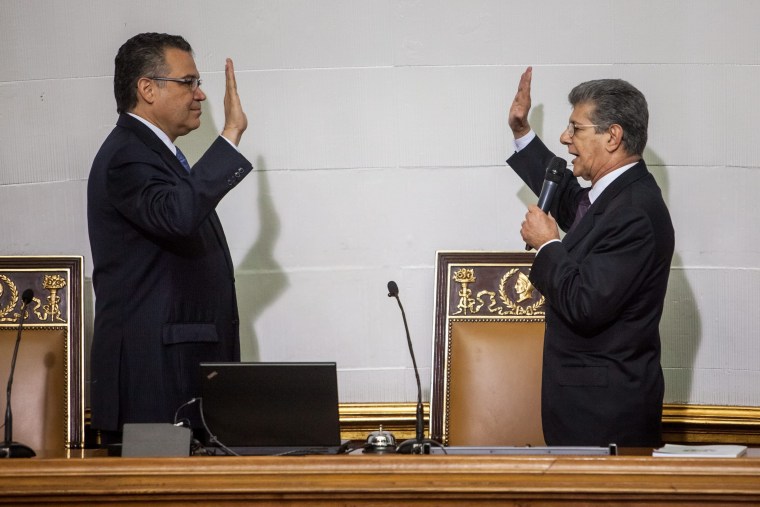CARACAS, Venezuela -- Leaning back in the mahogany chair that belonged to his imposing socialist predecessor, new congress boss Henry Ramos doesn't seem worried about being branded an out-of-touch conservative intent on burying the memory of late President Hugo Chavez and ousting his successor.
On the contrary, he's ready for a fight.
"If you call me a dinosaur, you're saying a dinosaur is what voters want. I didn't get here falling from a parachute," said Ramos, 72, who last week became president of the first opposition congress Venezuela has seen since Chavez launched his socialist revolution nearly two decades ago.
"We're not seeking confrontation, but if they insist...." he added with an arch of his eyebrow.
A veteran politician, Ramos was sworn in on Jan. 5 to replace outgoing legislative leader Diosdado Cabello, a former army officer widely seen as the revolution's enforcer.
Now second in the line of succession after President Nicolas Maduro's vice president, he promises to be just as much of a polarizing figure as Cabello.
During his first tumultuous days on the job, Ramos swore in three opposition lawmakers despite a Supreme Court order barring them from taking office. On Wednesday, those lawmakers were expected to leave their seats after the court said their presence made all congressional acts null.
Ramos was also recorded on videotape telling workers to remove all portraits of Chavez from the neoclassical capitol and take them to presidential palace "or the trash."
Ramos came under fire for the video, distributed by his own press chief, which infuriated the socialist government. The move also rankled some allies who want the opposition to keep the focus on an economic crisis marked by triple-digit inflation and widespread shortages.
He makes no secret of his swanky tastes. While top socialist officials dance to salsa music on live TV and proclaim their devotion to Venezuela's rice, beans and shredded beef dish, Ramos expounded on his love for expensive whisky, classical music and haute cuisine as smoke from his assistants' cigarettes curled toward the chandeliers in his office during an interview with The Associated Press.
The always-factious opposition coalition was widely expected to pick a moderate from the new generation to head congress after sweeping Dec. 6 legislative elections. But Ramos, trained as a lawyer, claimed the leadership gavel by doing what even his detractors say he does best: negotiating behind closed doors, in this case aligning with opposition hardliners who have adopted a six-month deadline to recall Maduro from office.
He's never been known for his personal grace.
In a 2006 diplomatic cable, then-U.S. Ambassador William Brownfield called Ramos "repellent" as well as "crude, abrasive, arrogant, and thin-skinned." In the same memo, he compares Ramos' style to that of Chavez.
Like the late populist leader, Ramos excels at playing to his base and driving his opponents to act in anger.
Members of the ruling United Socialist Party of Venezuela responded to his removing of all images of Chavez from the congressional compound by vowing to plaster every corner of Caracas with posters of the late leader.
Maduro has also doubled down on hardline policies in recent days. He left moderates spluttering last week when he appointed a new economic czar who says inflation does not exist in real life.
"The more Maduro takes a confrontational approach, the stronger he makes Henry Ramos's position," said Javier Corrales, who teaches Latin American politics at Amherst College in Massachusetts. "If he were to make a peace offering of some sort, it would divide the opposition, because some are willing to make pacts with the government."
In addition to serving in congress several times, Ramos, a descendant of Lebanese immigrants, has been a leader for decades in the Democratic Action party, which co-governed Venezuela during an era of politics that preceded Chavez when elites dominated the government.
